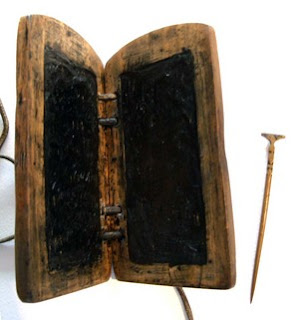Macbeth's Soliloquy in Latin
I have translated Macbeth's soliloquy into Latin. This despite a sink full of dishes and needing to look in on my bank account. But sometimes I just get tired of creeping along in the petty pace of all the day to day things I should be doing. I want to do something that makes my heart thrill and my synapses sing. This does it for me.
I couldn't make it fit into any meter known to ancient Roman poetry, but I think it still has a nice sound to it. I did use (both artfully and accidentally) several poetic devices my AP Latin students would recognize: polysyndeton, alliteration, chiasmus, hendiadys (pulverem mortemque). There's a little echo of Catullus in brevis lux that I think is also there in the original.
Et cras et cras et cras
hoc pusillo passu serpit a die ad diem
ad ultimam temporis memorati syllabam;
herique omne nostrum stultos ad pulverem
mortemque illuminavit. Exstinguaris, brevis lux!
Vita est nil nisi umbra ambulans, miser actor,
qui horam suam in scaena se sollicitat iactatque
deinde numquam postea auditur. Est fabula
ab idiota narrata, plena soni iraeque,
nil significans.
Here it is in Shakespeare's original English:
— To-morrow, and to-morrow, and to-morrow,
Creeps in this petty pace from day to day,
To the last syllable of recorded time;
And all our yesterdays have lighted fools
The way to dusty death. Out, out, brief candle!
Life is but a walking shadow, a poor player
That struts and frets his hour upon the stage
And then is heard no more. It is a tale
Told by an idiot, full of sound and fury
Signifying nothing.
— Macbeth (Act 5, Scene 5, lines 17-28)


Comments
Post a Comment